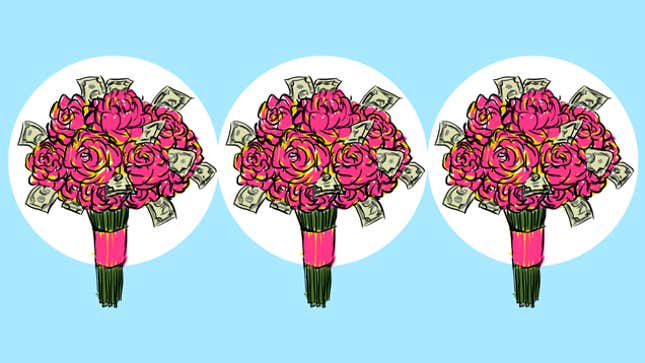Being a Bridesmaid Is Driving Me to the Brink of Bankruptcy
Latest

At $1,700 a pop, being a bridesmaid is a pricey commitment. So why do groomsmen get away with spending so little?
My phone rings at 8 AM on a Saturday morning. I groggily look at the caller ID and see that it’s one of my good friends from high school. Still half asleep, I answer. I can tell just by the way she says my name how excited she is as she tells me the big news: She got engaged last night.
“Here we go again,” has crossed my mind more than once when learning that another friend has gotten engaged. Because I have known that, after my friend is asked an important question and happily says yes, I will be asked another question — one that I will most likely want to respond to with, “Thank you for asking, but no.”
I am 30 years old and have been asked to be a bridesmaid numerous times in my life. Every time I have said yes. My experiences being a part of bridal parties have been largely positive. The brides have been considerate and respectful and usually selected dresses that actually can be worn again. Other brides have invited the bridal party to select their own dresses, saving us a few hundred dollars if we already own something the color and style she had in mind. I have never experienced anything even remotely resembling the stereotype of a narcissistic and hysterical “bridezilla” that unfortunately permeates our culture.
My reluctance to commit to being a bridesmaid stems from one simple reason: I can’t afford it any more. I consider the financial expectations that are placed on women in bridal parties to be excessive, unreasonable and sexist — and all too ingrained as a part of our culture as being “the way it is.” These expectations and commitments bear serious examination and consideration if they are going to change. And I think they need to change.
Much has been written about the average cost of a wedding as well the average cost of being a bridesmaid. A 2012 study by TheKnot.com and WeddingChannel.com reported that the average wedding budget was $28,427 — the highest number it had reached since 2008. And Mint.com estimated in 2011 that the average total cost of being a bridesmaid totaled $1,695. Because about one year typically passes between being asked to be a member of the bridal party and the actual wedding, the bridesmaid might not be aware of this total as it adds up, unless she keeps an ongoing tally of the expenses. And they do add up. The Today Show reported that approximately 10 percent of people said they went into debt simply to attend or be in a wedding.
How does this enormous number come to be? There are the obvious factors: the dress, which can cost anywhere from $100 to more than $400; and then the alterations, which can add another $100 or more; and the shoes which can ring up as anything from $30 to $150. Then there are all of the events related to the wedding: the showers, of which there are usually more than one (along with the customary bridal shower, recipe and lingerie showers are now the norm). Then there’s the bachelorette party, which, for many, has evolved from a night of bar hopping to a destination event that involves airfare or gas, a hotel and several expensive days and nights at spas, restaurants and bars. Factor in manicures, pedicures, hair and makeup for the wedding itself and the total cost could easily exceed that $1,695 average.
Along with the credit card charges, the time that being a bridesmaid requires of people can also be a burden, especially if members of the bridal party are not full-time salaried employees and are paid per hour (something that is far too common in today’s economy), or they normally work on the weekends, which is when the showers, parties and weddings are usually held. Even full-time, salaried employees have felt the strain of committing time to a wedding, as the United States is notorious for allotting only a small amount of paid vacation time to workers.
“I’ve been in a number of weddings, and each time it has always cost more than I anticipated,” one bridesmaid said. “I’ve considered saying ‘no’ at times when I was unemployed or not making much money, but have never declined because I didn’t want to hurt anyone’s feelings.” The emotional weight of being a bridesmaid resulted in everyone who was interviewed for this story asking to remain anonymous out of fear that the brides whose weddings they were in would read it.
-

-

-

-

-

-

-

-

-

-

-

-

-

-

-

-

-

-

-

-

-

-

-

-

-

-

-

-

-

-

-

-

-

-

-

-

-

-

-

-








































